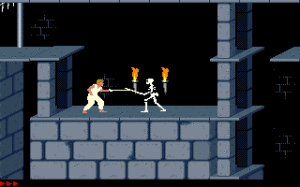Is PlayStation Home a Testing Ground for New Developers?
by CheekyGuy, HSM team writer
I ask this question, as it seems straightforward. I’ve always thought it to be the case. And now I’m seeing more and more new developers appear on Home and showcase their talent, all wanting a piece of the Sony pie.
I say “testing ground” because I’m going back to the days of bedroom software developers in the 80’s churning out game after game in the sole hope that maybe one day they might get a hit. It wasn’t just about churning the games — some of these young developers were keen to push the current technology as far as it could go, just to see what they could do with it.
Jordan Mechner (creator of the original Prince of Persia) was one of those “bedroom developers,” who was coding his first hit game (Karateka) at the tender age of nineteen. His newfound success helped him shape and create the Prince Of Persia series, which has become his most successful franchise to date.
Recently, the rise of mobile gaming has been a golden opportunity for new indie developers, with games such as Rovio Entertainment’s Angry Birds, which sold twelve-million copies through Apple’s App Store alone. You would think the same golden opportunity would apply to Home’s new developers — on paper, anyway.
The catch, of course, is that Home’s active user base — not the advertised number of unique registered accounts, but the actual number of repeat users (and the percentage thereof who truly monetize) is far smaller.
I recently spoke to John Ardussi, the original game director and lead programmer for Sony VASG’s excellent Cutthroats: Battle for Black Powder Cove, who is now creating content for Home under his own banner, Game Mechanics. He disagrees with my opinion that Home is a good place for brand-new developers to learn:

“No. Here is a fact that you may not know — most of the new developers [for Home] are from companies that were already doing work for Home. They did not have to learn about Home on their own dime.”
I put the same question to Nottingham, UK-based Lockwood, whose most recent product lines are “Horses of the Prairie” and “Drey Noir”, recently introducing “skinny jeans” for your avatar. Megan Egglesden, their product manager, had this to say:
 “Yes and No; Home does give developers the opportunity to try things out and experiment, which is really wonderful, and the community responds well to developers trying new things – a lot of the products released have an experimental nature about them. The platform is quite unusual and there’s nothing quite comparable to it, so it’s hard to predict how any product might be received. This makes the developing for Home a lot of fun, as we get to be very creative with it, but it also involves quite a lot of review and analysis.”
“Yes and No; Home does give developers the opportunity to try things out and experiment, which is really wonderful, and the community responds well to developers trying new things – a lot of the products released have an experimental nature about them. The platform is quite unusual and there’s nothing quite comparable to it, so it’s hard to predict how any product might be received. This makes the developing for Home a lot of fun, as we get to be very creative with it, but it also involves quite a lot of review and analysis.”
But this also leaves the question of the future of Home’s now-established developers, particularly as we come closer and closer to the next generation of the PlayStation console. As described in HSM team writer Phoenix’s latest article, Peter Edwards’ quote about Home no longer being a priority — back in 2009 — is certainly not something that anyone, developer or consumer alike, wants to hear. (However, it was reported a day later in the website VG24/7 that Mr. Edwards was apparently “misquoted” in defense of the report from “Edge” Online.)
If his quote was believed to be true, even at that time, by developers who have been loyal to Home, it paints a possibly bleak future for them, although they may continue to reap rewards with a game that puts their face on the Sony map. Will this exposure make it easier for them to find work if they choose to move beyond Home? Or would there be much more of a struggle to gain recognition — especially for the new developers?
The games industry is facing massive upheaval right now. The explosion of mobile gaming — on cell phones, tablets, etc. — coupled with upstart innovative consoles like Ouya, mean that small development teams can create a game with huge market penetration, without necessarily having to go through the traditional channels that have so defined and dominated the industry for the last two decades. For a Home developer, it certainly poses an interesting question: whether to adhere to a somewhat known formula — albeit with a small user base — or to merely use Home as a springboard and then migrate into the larger (and, to be fair, much deeper) open waters of the gaming industry at large.
Despite any forecasts of doom as the new console generation gets underway, I still think Home is the perfect springboard for breakout gaming talent, and I personally hope that this trend continues.
Share
| Tweet |




Great questions you have raised here Cheeks. I hope for all of our sakes that this is a good place for developers to learn and grow their craft and businesses for a period of time. I think many may keep developing for Home and still branch out elsewhere as well, as Loot already has. I wish the best for all of them on their endeavors